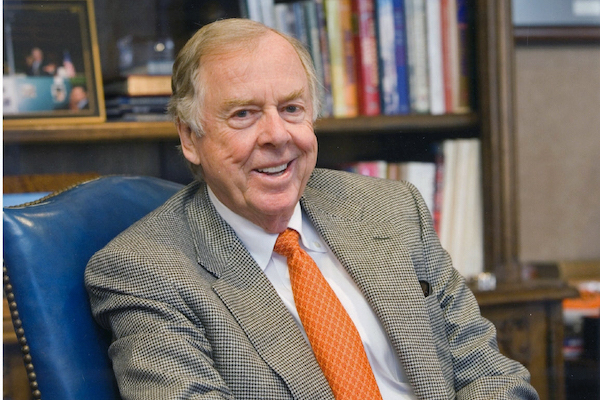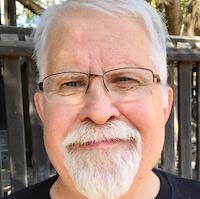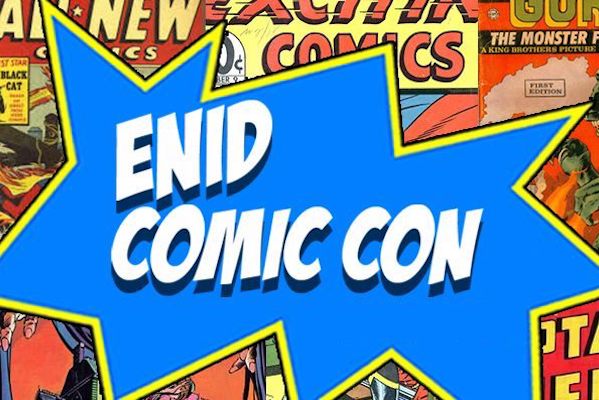DALLAS< TX - T.Boone Pickens, legendary energy executive and one of America’s best-known entrepreneurs, passed away on September 11, 2019 at the gae of 91.
-
Pickens, born May 22, 1928, in Holdenville, a small town in eastern Oklahoma, spent his adult years in Texas. The long-time Dallas resident, who had battled back from a series of strokes and further head injuries sustained in a 2017 fall, died of natural causes surrounded by friends and family, according to spokesman Jay Rosser.
-
In 1957, Pickens founded what later became Mesa Petroleum, one of the nation’s premiere independent natural gas and oil companies. During his career, Pickens’ face appeared regularly on virtually every significant business publication in America. He put a spotlight on the rights of the true owners of American businesses — its shareholders. He pounded on the doors of Japanese boardrooms, demanding that American investors have the same access to Japan and other foreign markets as foreign investors have in the United States.
-
In 1996, upon leaving Mesa Petroleum, at age 68, Pickens embarked on an even more successful career by forming an energy-focused investment firm, BP Capital, often one of America’s most successful hedge funds primarily focused on oil and gas commodities and energy-dependent equities.
-
Throughout his career, Pickens took to heart a lesson his father imparted upon him during college. When Pickens was not making sufficient progress toward a degree to satisfy his parents, his father told him: “A fool with a plan can outsmart a genius without one every time. We don’t see you have a plan.” The advice took: He quickly developed an aggressive plan to pursue a geology degree, which he earned. And at every challenging step in his business success thereafter, Pickens was sure he had a plan.
-
His 2008 New York Times Best Seller (the second of his career), The First Billion is the Hardest, also detailed what this country must do to win back its energy independence.
-
While Pickens preferred personal contact in his dealings, he was always open to change, and grew to “understand the power of social media, how it helped me build a 3.5-million-person (Pickens Plan) army.” Twitter ranks a good-humored May 2012 exchange between Pickens and the rapper Drake among the best in its history; it drove home a significant social media lesson for Pickens — “It’s one of the only ways that I would ever find myself in a dialogue with a rapper like Drake,” he noted at the time.
-
In 2017, Forbes magazine named him one of the 100 “Greatest Living Business Minds” in its 100th anniversary issue.
-
“Boone is one of those swashbucklers out of our history — a great, dynamic person who is a pioneer in multiple areas,” former Oklahoma senator Tom Coburn said. “He was a visionary. There are not many of those any more. He was probably little influenced by power and money.”
-
His so-called Boone-isms became a staple of his personality (see www.boonepickens.com). A few of his most quoted sayings include:
-
“Be willing to make decisions. That’s the most important quality in a good leader. Don’t fall victim to what I call the “ready-aim-aim-aim-aim” syndrome. You must be willing to fire.”
-
“Work eight hours and sleep eight hours, and make sure that they are not the same eight hours.”
-
“If you’re on the right side of the issue, just keep driving until you hear glass breaking. Don’t quit.”
-
“When you are hunting elephants, don’t get distracted chasing rabbits.”
-
In 2010, when fellow billionaires Warren Buffett and Bill Gates went public with their “Giving Pledge,” an invitation to “the wealthiest individuals and families in the world to commit to giving the majority of their wealth to philanthropy,” Pickens was already there.
-
Generous with his wealth, Pickens, a long-running member of the Forbes 400 “Rich List,” contributed to a wide range of philanthropic initiatives (www.tboonepickensfoundation.org), with his philanthropic impact reaching almost $2 billion through innovative matching initiatives. He formed the T. Boone Pickens Foundation in late 2006 to further his support of health and medical research and services, at-risk youth, and educational, entrepreneurial, political and athletic initiatives.
-
“Nobody has done what Boone did,” said Steve Taylor, retired Chief Justice of the Oklahoma Supreme Court. “He wanted to enjoy the fun of giving away money, and seeing what happened with it. Scholarships. Football stadiums. Engineering schools. Hospitals.”
-
He was among the most generous collegiate philanthropists of all time, contributing more than $500 million to his alma mater, Oklahoma State University (almost evenly divided between academics and athletics, at the institution where the football stadium bears his name). The support for OSU prompted Texas A&M’s 12th Man Magazine to include A&M’s decision not to renew Pickens’ $25-a-month basketball scholarship as one of the top 10 mistakes in Aggie history.
-
“He was the right guy at the right time to do something about our rusted-out relic of a stadium and give us the hope to win some football games,” said Mike Holder, OSU athletic director since 2005 and Pickens close friend for years before that. “He set a good example and gave at an unprecedented level to change people’s perceptions about Oklahoma State.”
-
Other beneficiaries of his giving include University of Texas Southwestern Medical Center and the University of Texas MD Anderson Cancer Center (among other initiatives, both received $50 million gifts in 2007), the Center for BrainHealth at The University of Texas at Dallas, Scottish Rite Children’s Hospital, the T. Boone Pickens Hospice and Palliative Care Center, the Wilmer Eye Institute at Johns Hopkins University, Big Brothers Big Sisters of North Texas, the Center for Missing and Exploited Children, the Fisher House Foundation, Happy Hill Farm, Jonathan’s Place, Meals on Wheels, the World Cranial Foundation, The Senior Source, USO Dallas/Fort Worth, Special Olympics of Texas, and Jubilee Park, an inner-city Dallas community.
-
“I like making money. I like giving money away. Giving money is not as fun as making it, but it’s a close second,” Pickens liked to say.
-

-








